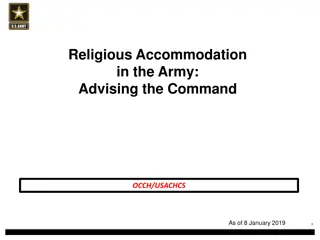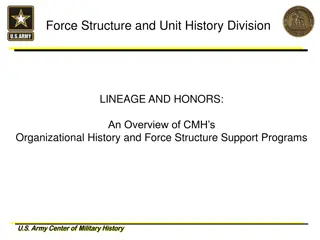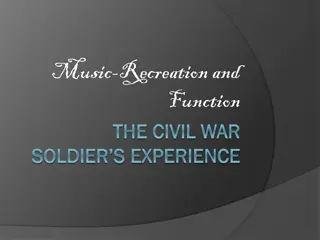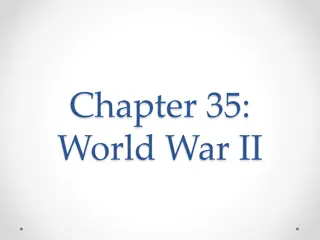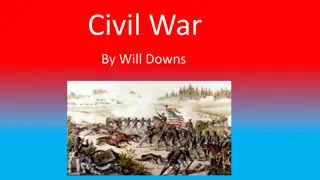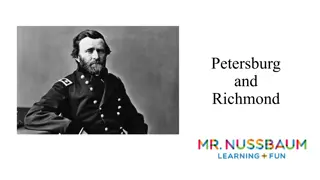Texas Contributions to the Confederate Army in the Civil War
Texas played a significant role in the Civil War by contributing soldiers to the Confederate Army. Governor Francis Lubbock led the state's efforts, organizing troops and sending units such as Hood's Texas Brigade and Terry's Texas Rangers to fight in key battles. Despite initial resistance to the draft, many Texans enlisted to defend the Confederacy, showcasing the state's military strength and dedication to the cause.
Download Presentation

Please find below an Image/Link to download the presentation.
The content on the website is provided AS IS for your information and personal use only. It may not be sold, licensed, or shared on other websites without obtaining consent from the author. Download presentation by click this link. If you encounter any issues during the download, it is possible that the publisher has removed the file from their server.
E N D
Presentation Transcript
TEXAS IN THE CIVIL WAR How did Texas CONTRIBUTE to the war efforts of the CONFEDERATE ARMY in the Civil War?
Texans Fight for the Confederacy Section 2 Organizing the Confederacy Francis Lubbock was elected as Texas s first Confederate governor under Confederate president Jefferson Davis. Most everything (post offices, federal operations) were converted to Confederate services.
Organizing the Confederacy Texas, and the other 10 Confederate states demanded that the Union surrender all federal property, especially military posts. Many forts were taken over peacefully which gave the Confederates much needed supplies. Union troops refused to leave Fort Sumter in Charleston, South Carolina. Fighting broke out on April 12, 1861, beginning the Civil War!
Military Strength of Texas Military Strength of Texas According to the 1860 census, 92,145 white males between the ages of 18 and 45 lived in Texas. Out of those, 60,000- 70,000 served as volunteers or soldiers in military units. In 1861 Governor Lubbock called for more volunteers.
Military Strength of Texas Military Strength of Texas 32 companies were organized. One group of volunteers, known as the Texas Brigade , were sent to Virginia to fight. This group was later called Hood s Texas Brigade after their commander, John Bell Hood. Confederate General Robert E. Lee later called this group my Texans . Hood's Brigade battle flag http://cavalry.km.ru/images/shelby.JPEG
Military Strength of Texas Military Strength of Texas Other units from Texas earned fame during the Civil War. Terry s Texas Rangers commanded by General Frank Terry Ross s Brigade commanded by General Sul Ross
General Paul Hbert enforced the draft that angered many Texans. He was replaced with General John Magruder, who After all the men who had volunteered to fight in the war had done so, more were needed to fight for the Confederacy. The Confederate started a draft requiring men to serve in the army. This angered many soldiers who had volunteered. They did not trust those who did not volunteer. Men who owned 20 or more slaves were exempted from the draft. forces for the remainder of the Draft the enlisting of persons for required service in the armed forces commanded the Confederate Sending Troops to Fight Sending Troops to Fight This really angered many. Civil War.
Military Affairs in Texas Most of the fighting in Texas centered on Confederate trying to keep the Gulf Coast ports open. Called the storehouse of the Confederacy, Texas provided weapons, food, and horses for the war effort. Although no major battles were fought in Texas, several important events took place on the coast or near the state s borders.
Little military action occurred in Texas. Twice, Union troops tried unsuccessfully tried to invade Texas. Most of the fighting was to keep ports open during the Union navy blockade. President Lincoln ordered a blockade of Southern ports in Texas. Galveston was one of the most important ports in Texas. Union troops captured Galveston Island. The Confederate troops attacked the Union ships in the harbor and obtained control of the island. Blockade action to stop transportation of goods or people into or out of an area
Other Military Campaigns A significant battle occurred on September 8, 1863, at Sabine Pass, a narrow channel along the Louisiana border. Union general Banks planned to move troops by ship through the pass. He then wanted to march north to cut off Texas s railroad connection to Louisiana. However, Lieutenant Richard Dowling stationed his Confederate union along that same narrow channel
As Union ships steamed into the channel, Confederate troops fired and sank two of them. No other Union ships tried to pass through. Confederate troops were victorious! General Banks tried again to invade Texas by sending troops up the Mississippi River and then the Red River. A small force of Confederate soldiers defeated the Union soldiers and forced them to retreat in Mansfield, Louisiana.
The last battle of the Civil War was fought on May 12, 1865, at Palmito Ranch in South Texas near Brownsville. Although the South (Confederates) had won this battle, they had lost the Civil War.
2 MAIN IDEA Texas contributed to Confederate military efforts by supplying soldiers to fight in important battles and defending the Gulf Coast. WHY IT MATTERS NOW MAIN IDEA WHY IT MATTERS NOW Texans connection to the South was strengthened during the Confederacy and remains strong today.
3 OBJECTIVES OBJECTIVES Describe what life was like in Texas during the Civil War. Analyze the economic effects of the Civil War in Texas. Analyze the social effects of the Civil War in Texas.
The Civil War Affects Life at Home The Effects of War Section 3 No major battles fought in Texas Texas did not suffer destruction of war as severely as Virginia, Tennessee, Georgia, and South Carolina. Texans still felt the pain of war. Texans went to fight in the war. left their families, jobs, homes
The Effects of War Citizens of Texas faced other problems: tension between those who supported the Confederacy and those who remained loyal to the Union Texas economy suffered a U.S. blockade reduced sale of farm products shortage of basic supplies made life difficult at home
Union Supporters in Texas Even though most Texans supported the Confederacy, about of Texans were against the succession. This number grew as the Confederate army lost battles, soldiers, soldiers lost limbs, and people at home faced hardships.
North Texas experienced a great deal of Union activity. In 1862 Union supporters in North Texas formed a secret society called the Peace Party. This group of Texans were going to secretively help the Union defeat the Confederates and Texas. Some vigilantes took matters into their own hands and hung 40 Peace Party members. do so vigilante a person who punishes criminals or takes control without authority to
These hangings stopped Union activity for months; however, many Texans that favored the Union (and Confederate army deserters) still met. German Texans were very divided on the issue and organized the Union Loyal League. This group was followed by 94 Confederate soldiers led by Lieutenant C.D. McRae. McRae caught up with the Union Loyal League group and a fight occurred. Battle of Nueces Many Union soldiers were killed, wounded, or executed later.
Wartime Economy Wartime Economy During the war Texans continued to raise cotton and cattle; however, the war greatly affected Texas s agriculture. Texans had trouble selling their cotton because the Union s blockade on Texas s ports on the Gulf of Mexico. With the men off to fight, many women took on the man s work. farming working in the post office factory work Texas was making 800 weapons a month in Austin and Tyler
Home Front Hardships Home Front Hardships With the blockade stopping the normal flow of trade goods, many items were in short supply. clothing shoes paper some newspapers could not be printed Medicines and hospital supplies were sent to the battle lines instead of the towns. People learned to adapt to these shortages: honey in place of sugar herbs in place of medicine roasted corn or acorns in place of coffee beans
Refugees During the war, thousands slaves were sent to Texas from farms and plantations in Louisiana, Arkansas, and Mississippi. Slaveholders tried to prevent them from moving around or be taken away when the Union army appeared. Many slaves were accompanied by their owners, who were usually unhappy at being forced from their homes.
The War's End Very few people thought the war would last as long as it did. By the spring of 1865, the war was on its fourth year. It seemed certain that the Confederacy would lose the Civil War. On April 9, 1865, Confederate general Robert E. Lee finally surrendered to Union general Ulysses S. Grant. This ended the Civil War. Now that the war was over, Texas along with the rest of the nation faced an uncertain future.
TIMELINE 18601865 1861 Texans approve secession from the United States 1862 Galveston Island is captured by Union troops 1863 Confederates recapture Galveston 1863 Sam Houston dies 1863 Battle of Sabine Pass takes place 1865General Robert E. Lee surrenders; war ends 1865 Last battle in Texas occurs at Palmito Ranch
Texas Secedes The growing debate over slavery and states rights divided the nation in the early 1860s. In 1861 Texas became the seventh state to secede from the Union and join the Confederate States of America. Texans Fight for the Confederacy Although no major battles were fought on Texas soil, Texans contributed to the war by joining the Confederate army, fighting against Union forces, and defending the Gulf Coast. The Civil War Affects Life at Home Texans experienced many hardships during the war. Tensions arose between Union and Confederate supporters. A declining economy and a shortage of basic supplies also made life difficult at home.
Men Present for Duty in the Civil War
Characteristics of a CIVIL WAR Soldier 1. Patience (Long war) 1861-1865 2. Loyalty (Fought against family) 3. Dedication 4. Strength 5. Motivation 6. Devotion 7. Father 8. Husband 9. Young 10. Farmers UNION SOLDIER Confederate Soldier
Role of African Americans in the CIVIL WAR 1. Kept uniforms clean and in order 2. Fought in war on some occasions 3. Rebuilt railways and factories destroyed by the Civil War 4. Worked in factories 5. Worked in hospitals








![❤[PDF]⚡ Civil War Talks: Further Reminiscences of George S. Bernard and His Fel](/thumb/20551/pdf-civil-war-talks-further-reminiscences-of-george-s-bernard-and-his-fel.jpg)






